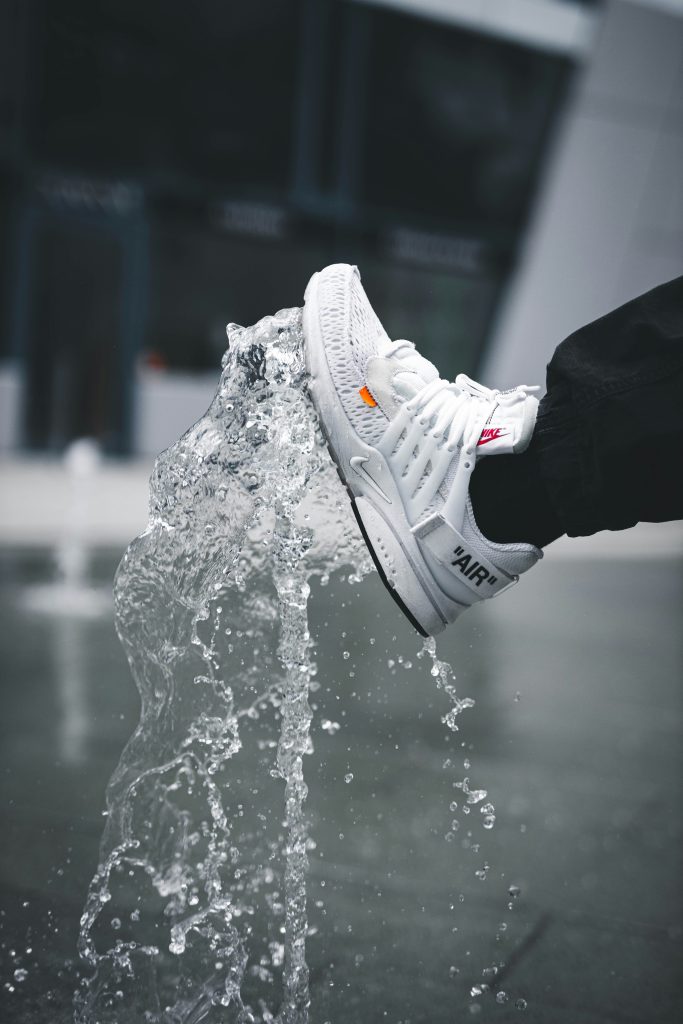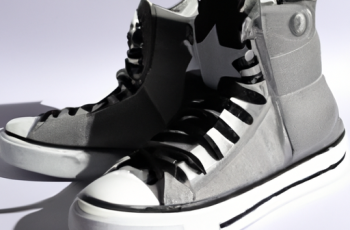In this article, you will discover the fascinating world of sustainable practices in the production of knit sneakers. From innovative materials to eco-friendly manufacturing processes, the fashion industry is undergoing a transformative shift towards sustainability. Discover how brands are incorporating recycled materials, reducing water and energy consumption, and supporting fair labor practices to create stylish and environmentally friendly footwear. Whether you are a fashion enthusiast or simply curious about the future of sustainable fashion, this article will show you the exciting developments in knit sneaker production. Get ready to step into a world where style meets sustainability!

1. Usage of Recycled Materials
Use of recycled polyester yarn
In an effort to reduce the reliance on new materials, many footwear companies are incorporating recycled polyester yarn into the production of knit sneakers. This yarn is made from recycled plastic bottles, which helps to divert waste from landfills and reduces the demand for virgin polyester. By using recycled polyester yarn, companies can create high-quality sneakers while also minimizing their environmental impact.
Incorporation of recycled rubber in outsoles
Another sustainable practice in the production of knit sneakers is the use of recycled rubber in outsoles. Instead of using new rubber, manufacturers are repurposing old rubber materials to create durable and flexible outsoles for sneakers. This not only reduces the consumption of natural resources but also helps to reduce the amount of waste ending up in landfills. By incorporating recycled rubber, companies are able to create sustainable footwear without compromising on quality or performance.
Utilization of recycled foam in midsoles
The utilization of recycled foam in midsoles is yet another sustainable practice seen in the production of knit sneakers. Instead of using virgin foam, manufacturers are incorporating recycled foam made from post-consumer materials. By doing so, companies are able to reduce their environmental footprint and contribute to the circular economy. Recycled foam provides the same level of comfort and support as traditional foam, while also reducing the demand for new materials and minimizing waste.
2. Water Conservation
Implementation of waterless dyeing techniques
One of the key sustainable practices in the production of knit sneakers is the implementation of waterless dyeing techniques. Traditional dyeing processes can be incredibly water-intensive, resulting in significant water wastage and pollution. However, by adopting waterless dyeing techniques, companies can minimize their water consumption and reduce their overall environmental impact. These techniques utilize innovative technologies that allow the dye to be applied directly to the yarn, eliminating the need for excessive water usage.
Reducing water consumption through efficient manufacturing processes
In addition to waterless dyeing techniques, sustainable manufacturing processes also focus on reducing water consumption throughout the production of knit sneakers. Companies are implementing efficient practices and technologies to minimize water usage at every stage, from the initial preparation of materials to the final finishing touches. By optimizing water consumption, companies can significantly reduce their ecological footprint and contribute to the conservation of this precious resource.
Installation of water-saving equipment in production facilities
To further enhance water conservation efforts, footwear manufacturers are also installing water-saving equipment in their production facilities. This includes advanced washing machines, automatic faucets, and water recycling systems. These innovative technologies help to minimize water wastage and promote responsible water consumption throughout the manufacturing process. By investing in water-saving equipment, companies can not only reduce their environmental impact but also save on operational costs in the long run.
3. Energy Efficiency
Utilization of renewable energy sources for manufacturing
One of the core principles of sustainable practices in the production of knit sneakers is the utilization of renewable energy sources for manufacturing. By harnessing the power of solar, wind, or hydroelectric energy, companies can significantly reduce their reliance on fossil fuels and decrease their carbon emissions. Transitioning to renewable energy sources not only helps to combat climate change but also promotes a cleaner and greener manufacturing process.
Implementation of energy-saving technologies in production processes
To further improve energy efficiency, companies are implementing energy-saving technologies in their production processes. This includes the use of energy-efficient machinery, LED lighting systems, and automated systems to optimize energy consumption. By embracing these technologies, companies can reduce their energy usage and lower their carbon footprint. Moreover, energy-saving innovations often come with cost savings, making it a win-win situation for both the environment and the business.
Effective waste heat recovery systems
In addition to utilizing renewable energy and implementing energy-saving technologies, companies are also focusing on effective waste heat recovery systems. These systems capture and reuse the waste heat generated during various production processes, such as drying or cooling. By utilizing waste heat, companies can reduce the energy required for heating and decrease their overall energy consumption. This not only helps to minimize environmental impact but also improves the overall efficiency of the manufacturing process.
4. Waste Reduction and Recycling
Use of recycled or upcycled materials for shoe components
To minimize waste and promote a circular economy, many footwear companies are utilizing recycled or upcycled materials for various shoe components. This includes using recycled polyester for the upper, upcycled leather for trims, and recycled rubber for outsoles. By incorporating these materials, companies are reducing the demand for new resources and diverting waste from landfills. This not only helps to minimize the environmental impact but also gives new life to materials that would have otherwise been discarded.
Implementation of recycling programs for material waste
Another sustainable practice in the production of knit sneakers is the implementation of recycling programs for material waste. Companies are collecting and recycling offcuts, scraps, and defective components to be transformed into new materials or products. By establishing these recycling programs, waste that would have otherwise ended up in landfills is given a second chance. This contributes to a more sustainable and circular approach to manufacturing, where waste is minimized, and resources are preserved.
Promotion of shoe recycling initiatives
In addition to recycling their own material waste, footwear companies are also encouraging consumers to participate in shoe recycling initiatives. These programs allow customers to return their old sneakers to be recycled or repurposed. By promoting these initiatives, companies are emphasizing the importance of responsible consumption and disposal. This not only diverts footwear from ending up in landfills but also provides an opportunity to create new products or materials from the recycled sneakers.

5. Ethical Labor Practices
Ensuring fair wages and safe working conditions for employees
In the production of knit sneakers, companies are prioritizing ethical labor practices by ensuring fair wages and safe working conditions for all employees. This includes adhering to labor laws and regulations, providing a safe and healthy working environment, and promoting a fair and equal workplace. By treating their employees with respect and dignity, companies are not only upholding ethical standards but also fostering a positive and productive workforce.
Regular audits and certifications for supply chain transparency
To further demonstrate their commitment to ethical labor practices, footwear companies are conducting regular audits and obtaining certifications for supply chain transparency. These audits ensure that labor practices are in compliance with ethical standards, and certifications provide transparency and accountability for consumers. By being transparent about their supply chain, companies are able to build trust with customers and demonstrate their commitment to fair and ethical labor practices.
Supporting fair trade and social responsibility initiatives
Footwear companies are also actively supporting fair trade and social responsibility initiatives in the production of knit sneakers. This includes partnering with fair trade organizations, supporting local communities, and promoting sustainable livelihoods. By supporting these initiatives, companies contribute to positive social and economic impact, ensuring that their business practices benefit not only their employees but also the broader communities in which they operate.
6. Carbon Footprint Reduction
Improving transportation efficiency and logistics
To reduce their carbon footprint, footwear companies are continuously improving transportation efficiency and logistics. This includes optimizing shipping routes, consolidating shipments, and utilizing eco-friendly transportation options. By streamlining transportation processes, companies can minimize fuel consumption and emissions associated with the transportation of materials and finished products. This leads to a significant reduction in carbon footprint and contributes to a more sustainable supply chain.
Optimizing packaging materials to reduce emissions
Another effective strategy for reducing the carbon footprint in the production of knit sneakers is optimizing packaging materials. Companies are utilizing eco-friendly packaging materials, such as recycled cardboard or biodegradable plastics, and right-sizing packaging to eliminate unnecessary waste. By reducing packaging materials and utilizing sustainable alternatives, companies can significantly reduce emissions associated with packaging and contribute to a more sustainable packaging practice.
Offsetting carbon emissions through tree planting programs
In addition to reducing their carbon emissions, footwear companies are also offsetting their remaining emissions through tree planting programs. By partnering with environmental organizations, companies can plant trees in areas in need of reforestation. Trees help to absorb carbon dioxide, a greenhouse gas, from the atmosphere, thereby offsetting the emissions generated throughout the production process. Through these tree planting programs, companies actively contribute to the restoration and preservation of the environment.

7. Innovation in Materials
Exploring sustainable and biodegradable alternatives to traditional materials
The production of knit sneakers is witnessing innovation in materials, with companies exploring sustainable and biodegradable alternatives to traditional materials. This includes the use of natural fibers like bamboo, hemp, or organic cotton for the upper, insole, and lining. These materials are renewable, biodegradable, and have a lower environmental impact compared to synthetic materials. By incorporating these sustainable alternatives, companies can create sneakers that are not only stylish and comfortable but also environmentally friendly.
Development of eco-friendly dyes and finishes
In addition to exploring sustainable materials, companies are also focusing on the development of eco-friendly dyes and finishes. Traditional dyes and finishes often contain harmful chemicals that can be detrimental to the environment and human health. However, by utilizing eco-friendly alternatives, such as water-based or plant-based dyes and finishes, companies can minimize their environmental impact and create sneakers that are safer for both the wearer and the planet.
Utilization of non-toxic adhesives and glues
Another aspect of sustainable practices in the production of knit sneakers is the utilization of non-toxic adhesives and glues. Many conventional adhesives and glues contain harmful chemicals that can have adverse effects on human health and the environment. By using non-toxic alternatives, companies can create sneakers that are free from harmful substances and minimize their ecological footprint. This ensures that the entire production process is safe and environmentally responsible.
8. Circular Economy Strategies
Implementing take-back programs for end-of-life sneakers
To promote a circular economy, footwear companies are implementing take-back programs for end-of-life sneakers. These programs allow customers to return their worn-out or unwanted sneakers to be properly disposed of or recycled. By collecting and recycling these sneakers, companies can prevent them from ending up in landfills and instead give them a second life as new materials or products. Implementing take-back programs not only reduces waste but also encourages responsible consumption among consumers.
Designing sneakers for disassembly and recyclability
In addition to implementing take-back programs, companies are also designing sneakers for disassembly and recyclability. By considering the entire lifecycle of the product, companies are incorporating design features that allow for easy disassembly and separation of materials. This enables efficient recycling and reuse of components, reducing waste and preserving valuable resources. By designing sneakers with recyclability in mind, companies are actively contributing to the circular economy and promoting sustainable consumption.
Promoting product longevity through repair and refurbishment services
To extend the lifespan of sneakers and reduce waste, companies are also promoting product longevity through repair and refurbishment services. By offering repair services, companies give customers the option to fix minor damages or wear and tear, rather than replacing the entire shoe. Additionally, refurbishment services allow customers to refresh their sneakers by replacing worn-out components or making repairs. By promoting these services, companies emphasize the importance of durability and provide customers with sustainable alternatives to constantly buying new sneakers.
9. Transparent Supply Chains
Traceability of raw materials to ensure sustainability standards
Sustainable practices in the production of knit sneakers also involve ensuring transparency and traceability of raw materials. Companies are implementing systems that allow them to track the origin and journey of materials, ensuring that they meet sustainability standards. This includes verifying that raw materials are sourced responsibly and produced in an environmentally and socially responsible manner. By ensuring traceability, companies can provide customers with the assurance that their products are ethically and sustainably made.
Collaboration with suppliers to promote sustainable practices
To further enhance transparency and promote sustainable practices, companies are collaborating with their suppliers. This collaboration ensures that suppliers are aligned with the company’s sustainability goals and are actively working towards minimizing their environmental impact. Regular communication and dialogue allow companies to share best practices, address challenges, and collectively drive sustainability initiatives throughout the supply chain. By working together, companies and suppliers can create a more sustainable and responsible industry.
Regular reporting and disclosure of environmental and social impact
To uphold transparency and accountability, footwear companies are engaging in regular reporting and disclosure of their environmental and social impact. This includes publishing sustainability reports that detail their progress towards achieving sustainable goals and their efforts in addressing environmental and social challenges. By sharing their successes, as well as areas for improvement, companies not only foster transparency but also invite collaboration and feedback from stakeholders. Regular reporting allows customers and other stakeholders to make informed decisions and hold companies accountable for their sustainability commitments.
10. Consumer Education and Engagement
Raising awareness about sustainable choices in footwear
One crucial aspect of sustainable practices in the production of knit sneakers is raising awareness about sustainable choices among consumers. Companies are actively engaging in educational initiatives to inform customers about the environmental and social impact of their footwear choices. Through marketing campaigns, social media, and educational materials, they promote the benefits of choosing sustainable sneakers and encourage consumers to make more informed and environmentally conscious decisions.
Providing information on eco-friendly certifications and labels
To help consumers make sustainable choices, companies are providing information on eco-friendly certifications and labels. This includes highlighting certifications such as the USDA Organic or the Global Recycled Standard, which guarantee the use of sustainable materials and responsible manufacturing processes. By providing this information, companies empower consumers to make informed choices and select sneakers that align with their values and sustainability preferences.
Encouraging consumer participation in sustainability initiatives
Footwear companies are also actively encouraging consumer participation in sustainability initiatives. This includes initiatives such as shoe donation drives, beach clean-ups, or sustainable living challenges. By involving consumers in these initiatives, companies foster a sense of shared responsibility and encourage individuals to take actionable steps towards a more sustainable future. Through these collective efforts, companies and consumers can work together to drive positive change and create a more sustainable footwear industry.
In conclusion, sustainable practices in the production of knit sneakers encompass a wide range of strategies that aim to minimize environmental impact, promote ethical labor practices, and engage consumers in sustainability initiatives. From the use of recycled materials to the implementation of energy-efficient technologies, companies are continuously striving to reduce their ecological footprint. By prioritizing transparency, promoting consumer education, and embracing circular economy principles, companies can create sneakers that are not only stylish and comfortable but also sustainable and environmentally friendly. Together, these sustainable practices contribute to a more responsible and conscious footwear industry.


